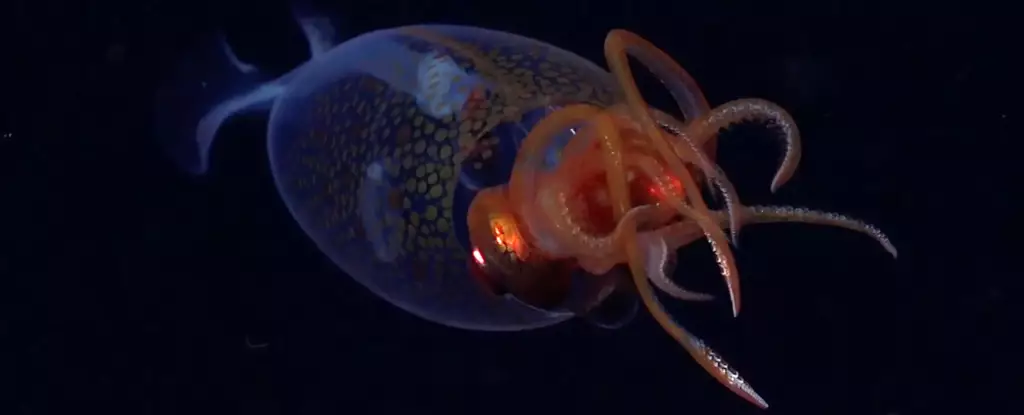Few creatures evoke the same level of wonder and terror as the colossal squid. Often overshadowed by its more famous cousin, the giant squid, this enigmatic denizen of the Antarctic abyss stands as a testament to the mysteries of our planet’s oceans. The colossal squid’s very existence remained unknown to scientists until just over a century ago, highlighting the vast realms of our oceans that are still shrouded in mystery. With recent footage capturing this magnificent creature in its natural habitat, it seems a new chapter in marine biology has begun—one that proudly embraces the peculiarities of life hidden deep below the waves.
The colossal squid—officially recognized as the heaviest invertebrate on the planet—can reach mind-boggling dimensions, with lengths of up to 23 feet and weights exceeding 1,100 pounds. However, capturing a glimpse of one, especially in the deep where it thrives, is nothing short of extraordinary. This recent sighting has invigorated researchers and marine enthusiasts alike, igniting discussions about what other wonders may await discovery in the ocean’s depths. The footage, taken from a remotely operated vehicle, serves not only as validation for existing theories about the squid’s behavior but also as an invigorating insight into the marvels still lurking in our oceans.
Scientific Elation and Conservation Conversations
The excitement within the scientific community surrounding this sighting underscores a broader narrative about ocean exploration and the preservation of these unexplored frontiers. Kat Bolstad, a prominent researcher in cephalopod studies, exclaimed that the footage represents “one of the most exciting observations” of her career. Such enthusiasm is indicative of a shared belief: understanding these creatures is critical not just for scientific knowledge but also for conservation efforts.
As nations grapple with complex climate issues and rapid environmental changes, the cry for more information about marine life has never been more urgent. The colossal squid serves as a symbol in this fight, with its precarious existence reminding us that the ocean’s mysteries should not be exploited or neglected. Every sighting carries implications—what knowledge we gather could play a crucial role in safeguarding ecosystems that are continually threatened by human activity. For instance, how will the exploitation of marine resources impact these elusive creatures’ habitats? Such questions are fundamental in redirecting conservation efforts.
The Allure of the Unknown
The sheer size and unusual traits of the colossal squid fuel the enduring allure and mythology surrounding deep-sea creatures. As our technology advances, enabling deeper exploration of the ocean, we find ourselves at the dawn of a new era in marine science. Gone are the days when we assumed the depth of the sea was entirely alien—now we realize that many extraordinary forms of life dwell beneath the surface, contesting our previous notions of biodiversity.
While some may see scientific exploration as merely a pursuit of knowledge, it is essential to recognize its cultural implications. The colossal squid’s recent appearance enlivens an age-old narrative about humanity’s relationship with nature. Our oceans are seen as vast, boundless, and often frightening; they inspire both art and fear, cautionary tales of their vast, untamable territories. The colossal squid, in essence, paints a picture of the ocean not as an enemy, but as a realm filled with intricate biological wonders waiting to be appreciated—a befitting metaphor for all facets of life in an increasingly interconnected world.
A Call for Engagement and Action
The spotlight now shines upon the colossal squid. As experts analyze the latest footage, we are reminded that this is not just a scientific achievement but a call to action for both environmentalists and the general public. Our oceans are, perhaps, our most critical regulatory systems, and creatures like the colossal squid embody that vibrant interplay. As stakeholders in the narrative of our oceans, it is time we champion responsible stewardship and advocate for sustainable practices that will allow both marine life and humanity to thrive together.
Indeed, the discoveries surrounding colossal squids could mark the turning point in how we perceive deep-sea ecosystems. Perhaps it’s time to rethink our approach, not just as explorers, but as guardians of the natural world. Just as the colossal squid captured fleeting images of life unseen for so long, so too must we consider how our actions will play out on the canvas of the ocean—hoping to ensure that future generations can marvel at these magnificent enigmas as we now do.

Leave a Reply